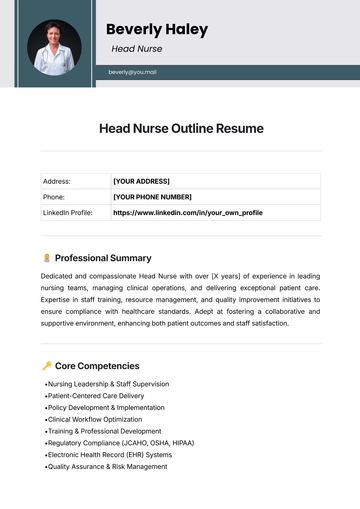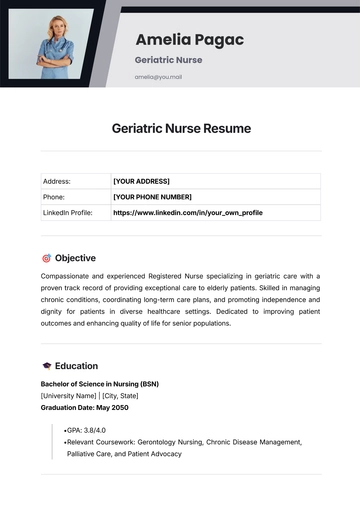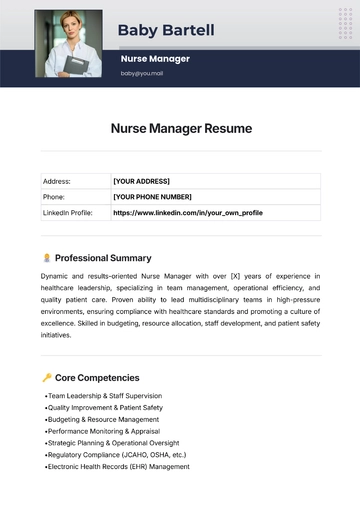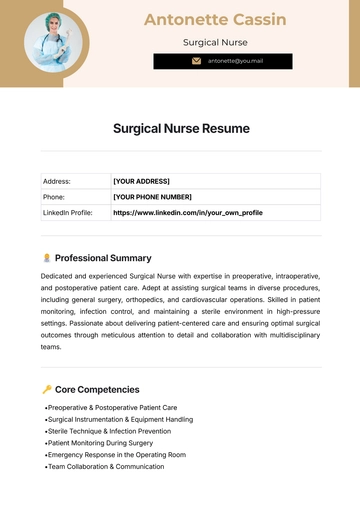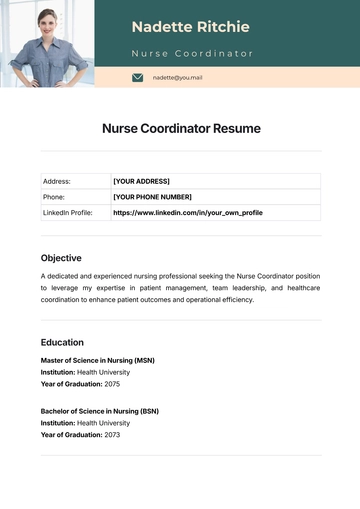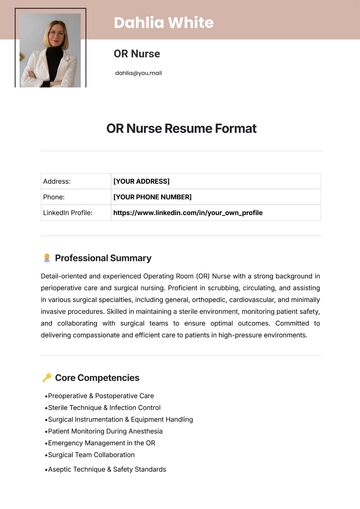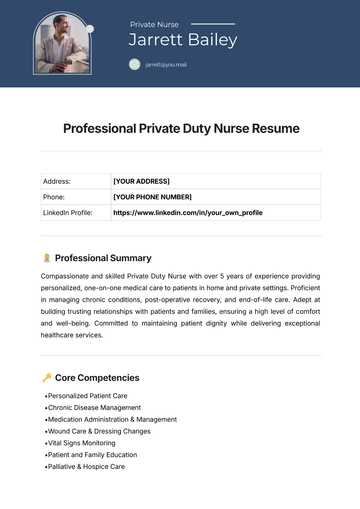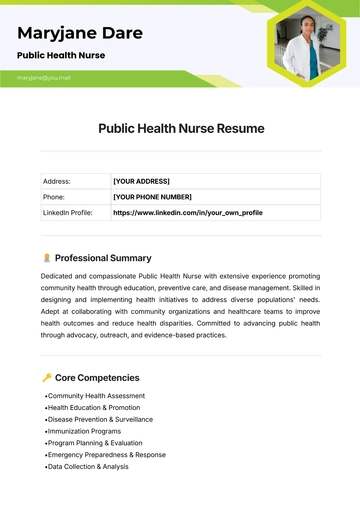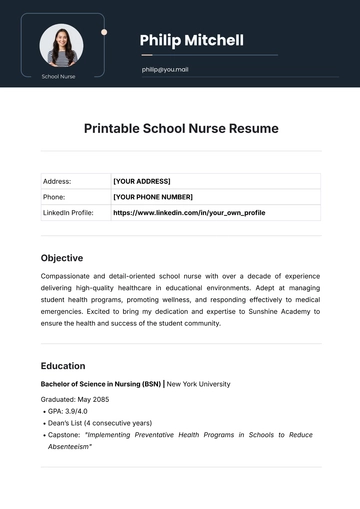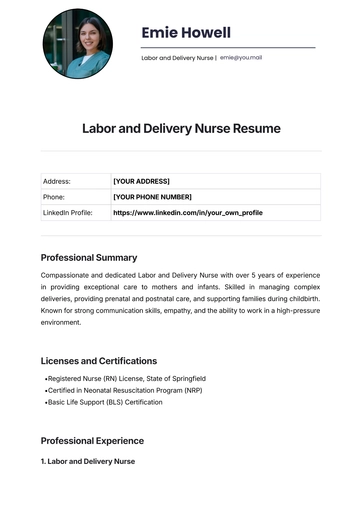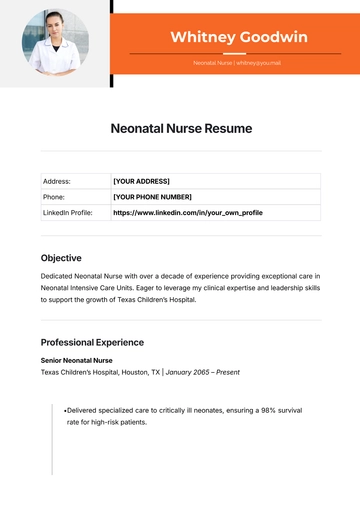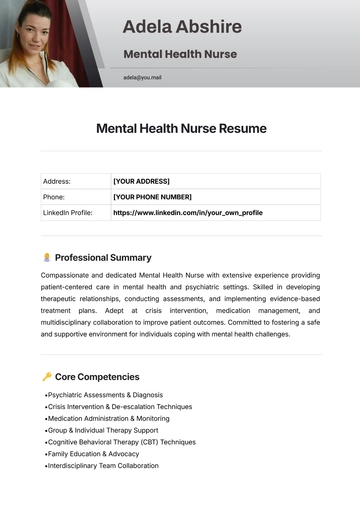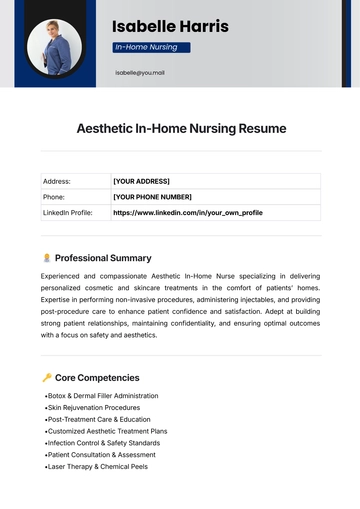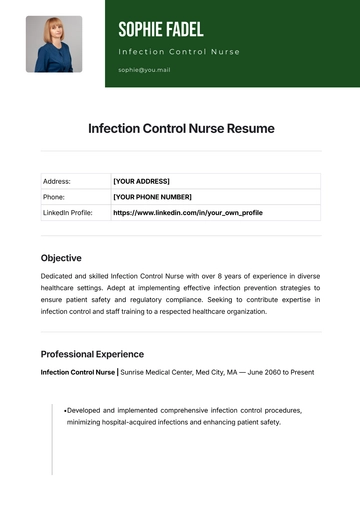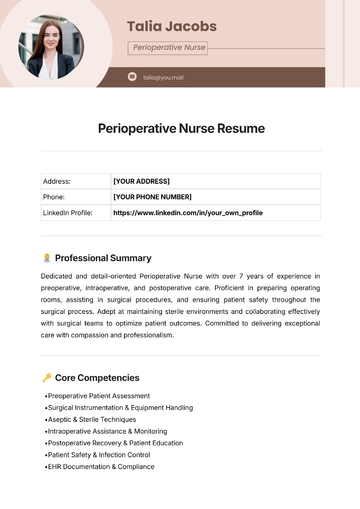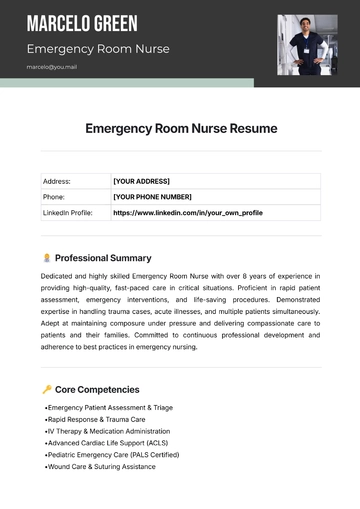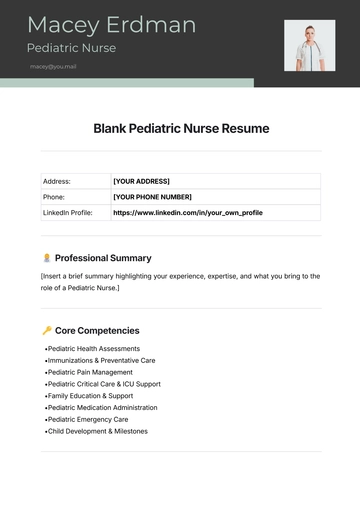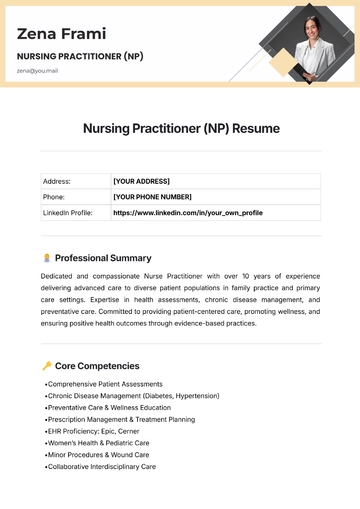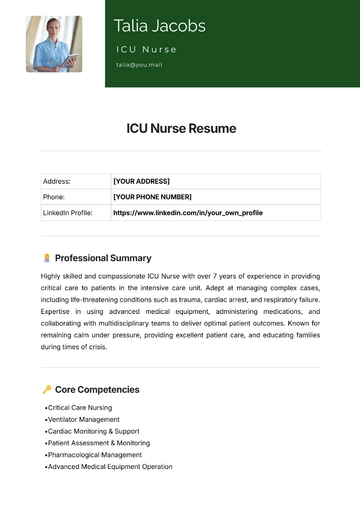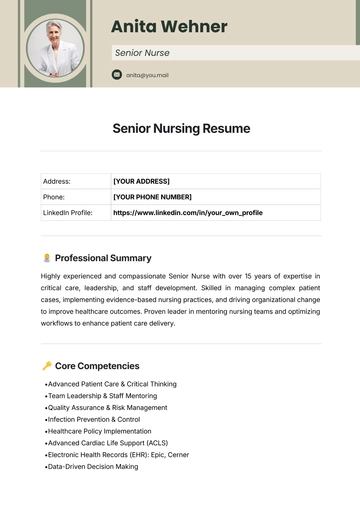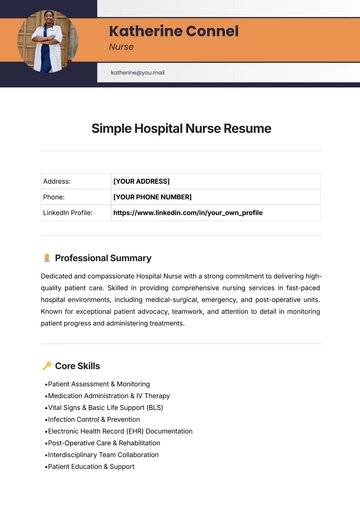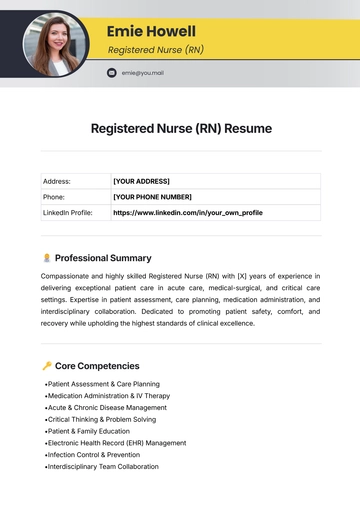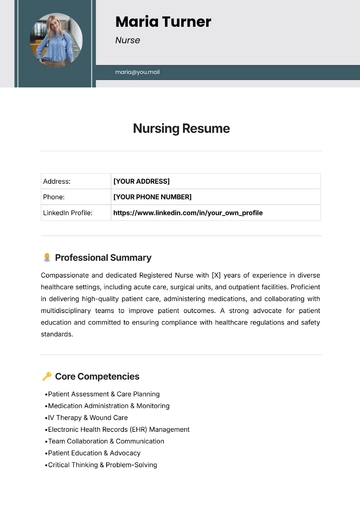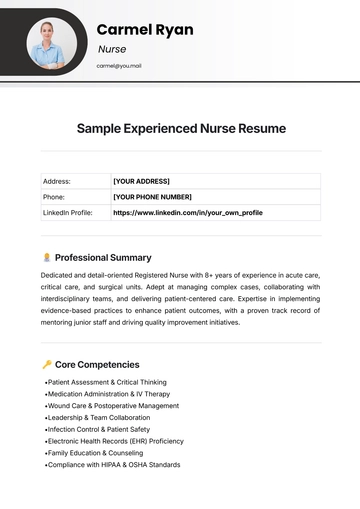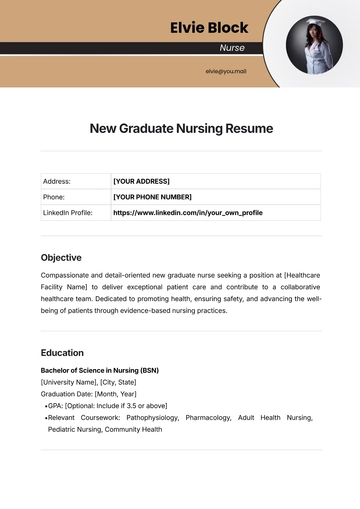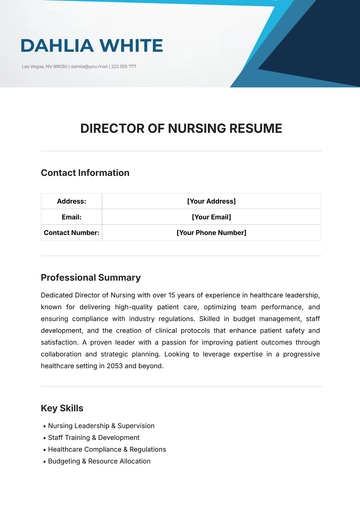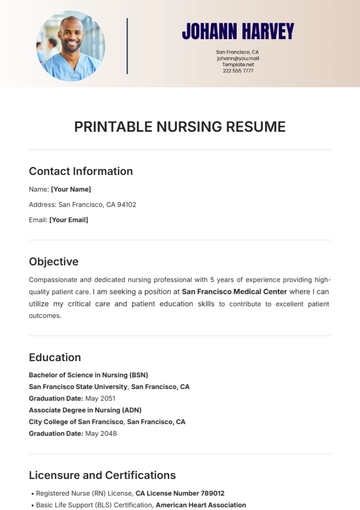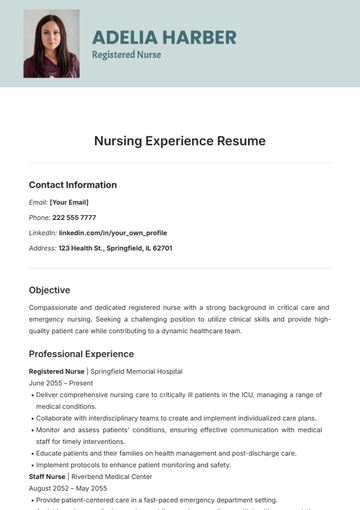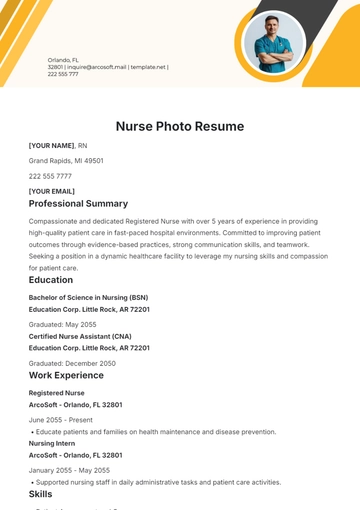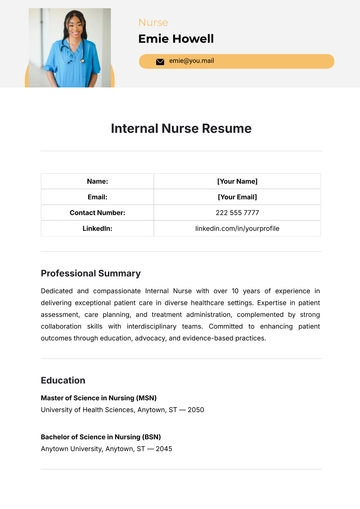Free Doctor Office Nurse Resume
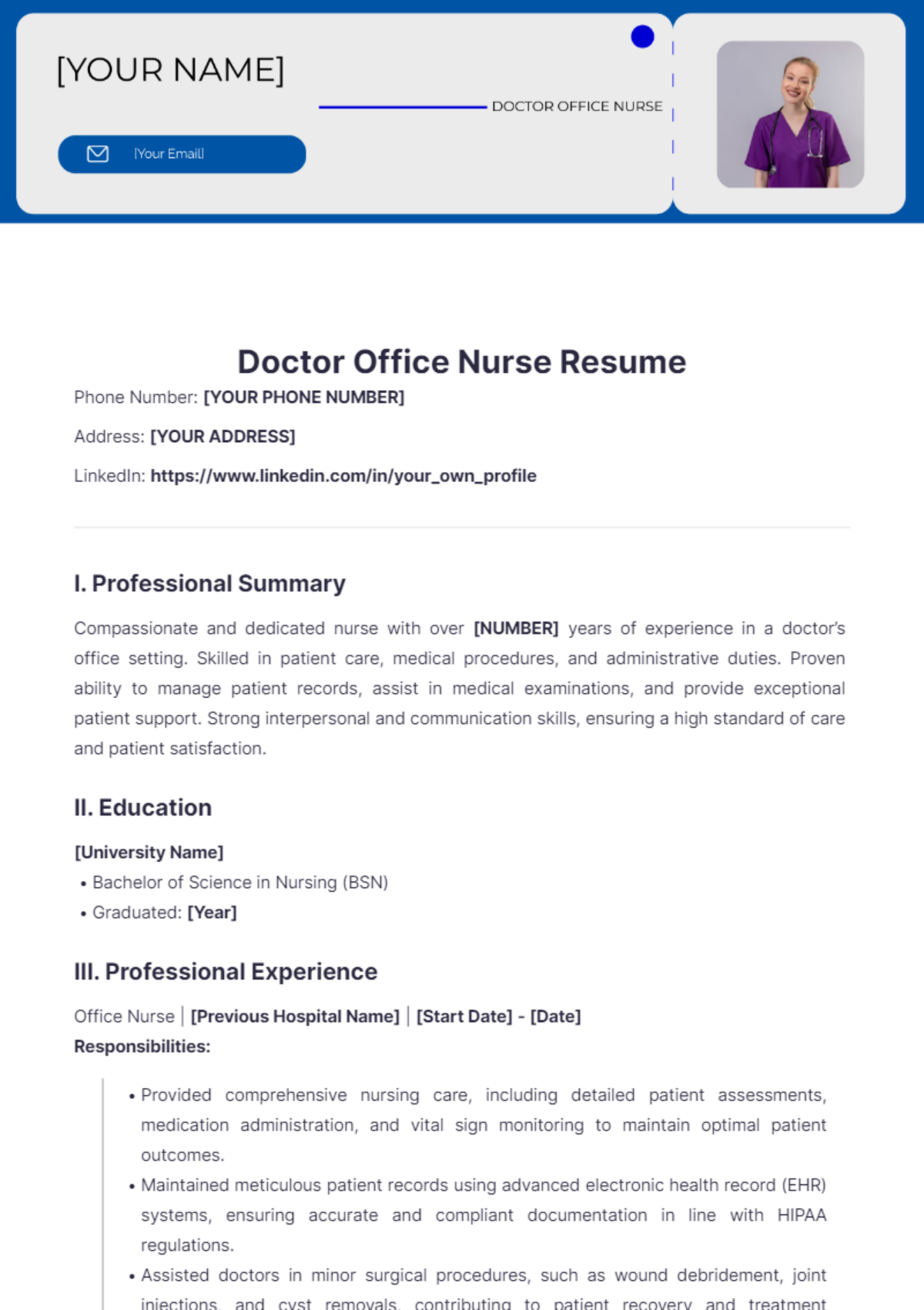
Phone Number: [YOUR PHONE NUMBER]
Address: [YOUR ADDRESS]
LinkedIn: https://www.linkedin.com/in/your_own_profile
I. Professional Summary
Compassionate and dedicated nurse with over [NUMBER] years of experience in a doctor’s office setting. Skilled in patient care, medical procedures, and administrative duties. Proven ability to manage patient records, assist in medical examinations, and provide exceptional patient support. Strong interpersonal and communication skills, ensuring a high standard of care and patient satisfaction.
II. Education
[University Name]
Bachelor of Science in Nursing (BSN)
Graduated: [Year]
III. Professional Experience
Office Nurse | [Previous Hospital Name] | [Start Date] - [Date]
Responsibilities:
Provided comprehensive nursing care, including detailed patient assessments, medication administration, and vital sign monitoring to maintain optimal patient outcomes.
Maintained meticulous patient records using advanced electronic health record (EHR) systems, ensuring accurate and compliant documentation in line with HIPAA regulations.
Assisted doctors in minor surgical procedures, such as wound debridement, joint injections, and cyst removals, contributing to patient recovery and treatment outcomes.
Coordinated diagnostic laboratory tests and communicated results to doctors for patient diagnosis and treatment planning.
Educated and guided patients on health management, disease prevention, and post-care instructions to optimize patient health and well-being.
Executed advanced phlebotomy techniques, including pediatric and geriatric venipuncture, and collected specimens for a variety of laboratory tests to support accurate diagnoses.
Managed office administration, including scheduling patient appointments, verifying insurance coverage, and handling patient billing.
Fostered collaborative relationships with doctors and medical staff to ensure seamless patient care and efficient workflow.
IV. Skills
Patient Care Expertise: Proficient in patient assessments, wound care, medication administration, and patient education to promote health and recovery.
Medical Office Administration: Skilled in appointment scheduling, insurance verification, patient billing, and EHR management to maintain office efficiency and patient satisfaction.
Clinical Procedures: Expertise in advanced phlebotomy techniques, minor surgical assistance, joint injections, and laboratory specimen collection to ensure accurate patient diagnoses.
HIPAA Compliance: Thorough understanding of patient privacy regulations and documentation accuracy requirements.
Medical Terminology Mastery: Advanced knowledge of medical terminology to facilitate clear communication with medical staff and patients.
Multitasking and Time Management: Ability to manage patient care and administrative duties simultaneously while ensuring high standards of care.
V. Certifications
Certified Nurse (RN) License: Active RN license in [State/Region], up to date with state-mandated continuing education requirements.
Basic Life Support (BLS) Certification: Demonstrating proficiency in CPR, defibrillation, and basic emergency response techniques.
Advanced Cardiovascular Life Support (ACLS) Certification: Advanced skills in managing patients with serious cardiovascular conditions.
Pediatric Advanced Life Support (PALS) Certification: Specialized training for providing care to children in emergencies.
VI. Professional Development
Continuing Medical Education (CME): Engaged in ongoing educational programs, workshops, and seminars to stay current with advances in nursing practice, medical procedures, and patient care techniques.
Leadership and Team Collaboration Training: Participated in leadership courses to strengthen team dynamics and promote efficient patient care coordination among medical staff.
Innovative Technology Integration: Trained in adopting new medical technologies, including EHR system upgrades and advanced diagnostic equipment, to enhance patient care outcomes.
Cultural Competency and Diversity Training: Courses focused on understanding and effectively managing diverse patient populations to ensure equitable and personalized care.
- 100% Customizable, free editor
- Access 1 Million+ Templates, photo’s & graphics
- Download or share as a template
- Click and replace photos, graphics, text, backgrounds
- Resize, crop, AI write & more
- Access advanced editor
Stand out with Template.net's Doctor Office Nurse Resume. This customizable and editable template, accessible through our Ai Editor Tool, allows you to highlight your nursing skills and experience in a medical office setting.
You may also like
- Simple Resume
- High School Resume
- Actor Resume
- Accountant Resume
- Academic Resume
- Corporate Resume
- Infographic Resume
- Sale Resume
- Business Analyst Resume
- Skills Based Resume
- Professional Resume
- ATS Resume
- Summary Resume
- Customer Service Resume
- Software Engineer Resume
- Data Analyst Resume
- Functional Resume
- Project Manager Resume
- Nurse Resume
- Federal Resume
- Server Resume
- Administrative Assistant Resume
- Sales Associate Resume
- CNA Resume
- Bartender Resume
- Graduate Resume
- Engineer Resume
- Data Science Resume
- Warehouse Resume
- Volunteer Resume
- No Experience Resume
- Chronological Resume
- Marketing Resume
- Executive Resume
- Truck Driver Resume
- Cashier Resume
- Resume Format
- Two Page Resume
- Basic Resume
- Manager Resume
- Supervisor Resume
- Director Resume
- Blank Resume
- One Page Resume
- Developer Resume
- Caregiver Resume
- Personal Resume
- Consultant Resume
- Administrator Resume
- Officer Resume
- Medical Resume
- Job Resume
- Technician Resume
- Clerk Resume
- Driver Resume
- Data Entry Resume
- Freelancer Resume
- Operator Resume
- Printable Resume
- Worker Resume
- Student Resume
- Doctor Resume
- Merchandiser Resume
- Architecture Resume
- Photographer Resume
- Chef Resume
- Lawyer Resume
- Secretary Resume
- Customer Support Resume
- Computer Operator Resume
- Programmer Resume
- Pharmacist Resume
- Electrician Resume
- Librarian Resume
- Computer Resume
- IT Resume
- Experience Resume
- Instructor Resume
- Fashion Designer Resume
- Mechanic Resume
- Attendant Resume
- Principal Resume
- Professor Resume
- Safety Resume
- Waitress Resume
- MBA Resume
- Security Guard Resume
- Editor Resume
- Tester Resume
- Auditor Resume
- Writer Resume
- Trainer Resume
- Advertising Resume
- Harvard Resume
- Receptionist Resume
- Buyer Resume
- Physician Resume
- Scientist Resume
- 2 Page Resume
- Therapist Resume
- CEO resume
- General Manager Resume
- Attorney Resume
- Project Coordinator Resume
- Bus Driver Resume
- Cook Resume
- Artist Resume
- Pastor Resume
- Recruiter Resume
- Team Leader Resume
- Apprentice Resume
- Police Resume
- Military Resume
- Personal Trainer Resume
- Contractor Resume
- Dietician Resume
- First Job Resume
- HVAC Resume
- Psychologist Resume
- Public Relations Resume
- Support Specialist Resume
- Computer Technician Resume
- Drafter Resume
- Foreman Resume
- Underwriter Resume
- Photo Resume
- Teacher Resume
- Modern Resume
- Fresher Resume
- Creative Resume
- Internship Resume
- Graphic Designer Resume
- College Resume
